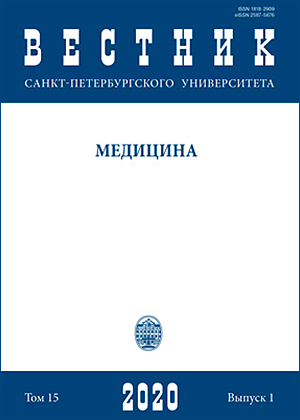Gender characteristics of autoimmune hypogonadism
DOI:
https://doi.org/10.21638/spbu11.2020.102Abstract
Autoimmune gonadal lesions represent a highly heterogenous conditions affecting men and women of reproductive age and resulting in loss of endocrine function and, eventually, infertility. Well-known and well-documented risk factors exist, and the presence or suspicion of autoimmune disorder should be regarded as an important one. For the purpose of the present study, ELISA kits according to the proprietary technology for detection of antitesticular and antiovarian antibodies were developed. Among men with autoimmune orchitis an increased level of antibodies to steroid-producing testicular cells, decreased serum total and free testosterone and altered semen parameters were found. Combined autoimmune diseases were present (autoimmune thyroiditis, vitiligo, type 1 diabetes) in 13.5 % of cases. In women with autoimmune oophoritis the main finding was anovulation with preserved serum FSH and LH levels (91.6 %) and luteal insufficiency (8.4 %). In total, 19.4 % of patients had other autoimmune diseases (autoimmune thyroiditis, vitiligo, chronic autoimmune hepatitis, rheumatoid arthritis, systemic lupus erythematosus).
Keywords:
antiovarian antibodies, antitesticular antibodies, ovarian insufficiency, hypogonadism
Downloads
References
References
Downloads
Published
How to Cite
Issue
Section
License
Articles of "Vestnik of Saint Petersburg University. Medicine" are open access distributed under the terms of the License Agreement with Saint Petersburg State University, which permits to the authors unrestricted distribution and self-archiving free of charge.





